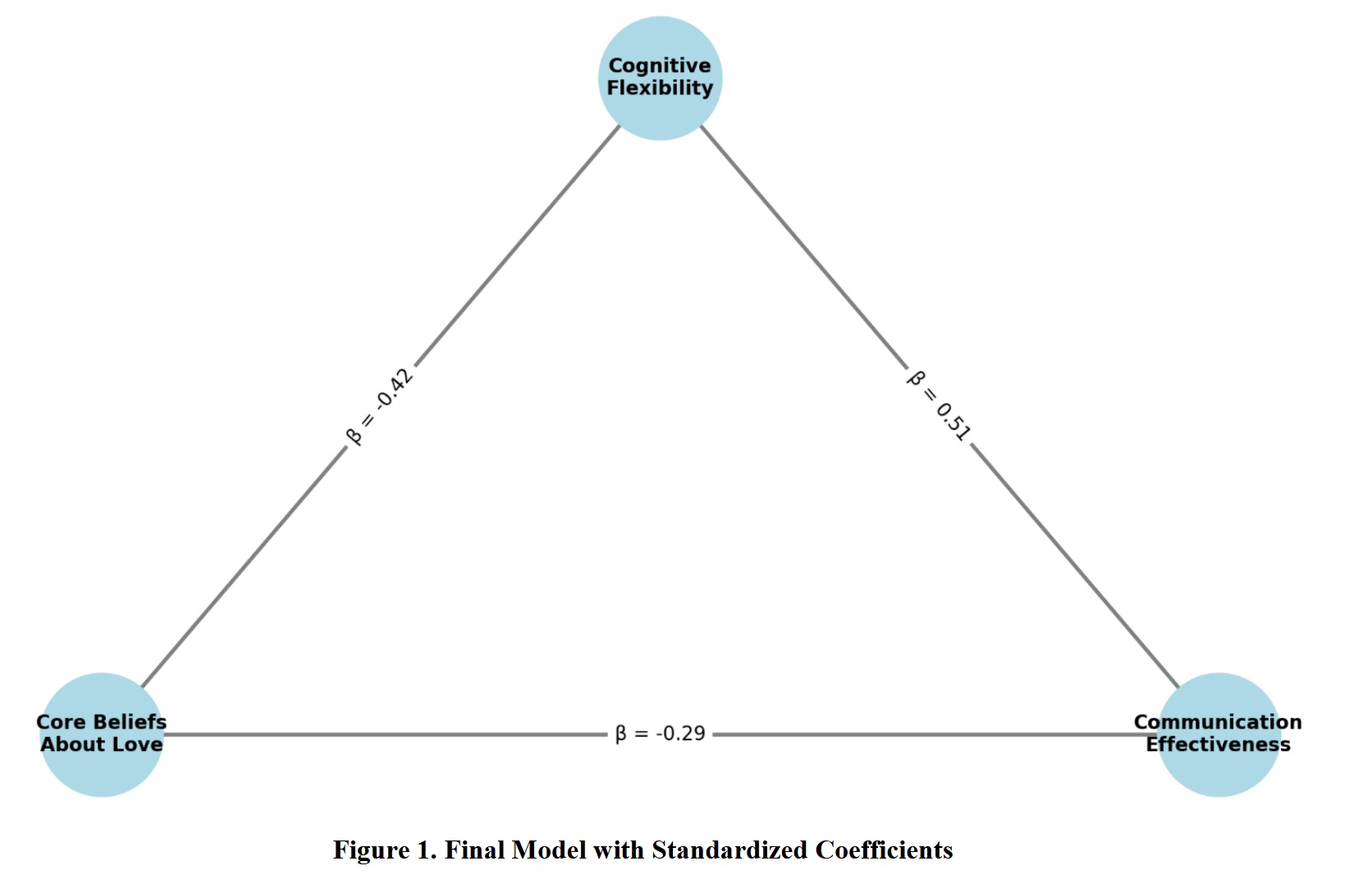Core Beliefs About Love and Communication Effectiveness: The Mediating Role of Cognitive Flexibility
Keywords:
Core beliefs about love, cognitive flexibility, communication effectiveness, romantic relationshipsAbstract
This study aimed to investigate the mediating role of cognitive flexibility in the relationship between core beliefs about love and communication effectiveness in romantic relationships. The research employed a descriptive correlational design with a sample of 385 adult participants from Iraq, selected based on Morgan and Krejcie’s sample size table. Participants completed three standardized instruments: the Love Attitudes Scale (LAS), the Cognitive Flexibility Inventory (CFI), and the Communication Patterns Questionnaire (CPQ). Data were analyzed using SPSS-27 for descriptive statistics and Pearson correlation coefficients, and AMOS-24 for Structural Equation Modeling (SEM). Model fit was assessed using indices such as CFI, TLI, RMSEA, GFI, and χ²/df. Results indicated a significant negative correlation between core beliefs about love and communication effectiveness (r = -0.47, p < .001), and between core beliefs and cognitive flexibility (r = -0.42, p < .001). A significant positive correlation was found between cognitive flexibility and communication effectiveness (r = 0.52, p < .001). SEM results showed an acceptable model fit (χ²/df = 2.02, CFI = 0.96, RMSEA = 0.052). Path analysis revealed that core beliefs significantly predicted both cognitive flexibility (β = -0.42, p < .001) and communication effectiveness directly (β = -0.29, p < .001), as well as indirectly through cognitive flexibility (indirect effect B = -0.32, p < .001). The total effect of core beliefs on communication effectiveness was β = -0.52. The findings support the mediating role of cognitive flexibility in the association between core beliefs about love and communication effectiveness. Enhancing cognitive flexibility may mitigate the adverse effects of rigid love schemas and improve relational communication, particularly in culturally conservative contexts.
Downloads
References
Bir, K., Burcu, Ç., Kahraman, B., Mersin, S., & Acun, A. (2022). Relationship of Cognitive Control and Flexibility With Anxiety Among Nursing Students in the Times of COVID-19 Pandemic: A Cross-Sectional Study. 4(4), 324-331. https://doi.org/10.35365/ctjpp.22.4.03
Çankaya, Ö., & Aydoğan, N. (2022). The Relationship Between Argumentation Skills and Cognitive Flexibility of Pre-Service Science Teachers. Asian Journal of Education and Training, 8(2), 51-59. https://doi.org/10.20448/edu.v8i2.3963
Er, Y. O., & Deniz, M. E. (2022). The Mediating Role of Self-Compassion and Cognitive Flexibility in the Relationship Between Differentiation of Self and Subjective Well-Being. Cukurova University Faculty of Education Journal, 51(3), 1642-1680. https://doi.org/10.14812/cuefd.1074927
Gür, T. B. (2023). The Mediating Role of Emotional Dysregulation and Cognitive Flexibility in the Relationship Between Self-Compassion and Forgiveness. Uluslararası İnovatif Eğitim Araştırmacısı, 3(CİLT 3 SAYI 3), 345-372. https://doi.org/10.29228/iedres.70061
Haft, S. L., Kepinska, O., Caballero, J., Carreiras, M., & Hoeft, F. (2019). Attentional Fluctuations, Cognitive Flexibility, and Bilingualism in Kindergarteners. Behavioral Sciences, 9(5), 58. https://doi.org/10.3390/bs9050058
Hayatbini, N., Knauft, K., & Kalia, V. (2021). Cognitive Reappraisal Moderates the Relationship Between Perfectionism and Cognitive Flexibility. Journal of Clinical Psychology, 77(7), 1685-1699. https://doi.org/10.1002/jclp.23124
Howlett, C. A., Wewege, M. A., Berryman, C., Oldach, A., Jennings, E., Moore, E., Karran, E. L., Szeto, K., Pronk, L., Miles, S., & Moseley, G. L. (2022). Back to the Drawing Board—The Relationship Between Self-Report and Neuropsychological Tests of Cognitive Flexibility in Clinical Cohorts: A Systematic Review and Meta-Analysis. Neuropsychology, 36(5), 347-372. https://doi.org/10.1037/neu0000796
Hu, S., Zhong, Z., Zhang, J., & Zheng, X. (2018). Cognitive Flexibility and Advice Network Centrality: The Moderating Role of Self-Monitoring. Frontiers in psychology, 9. https://doi.org/10.3389/fpsyg.2018.01947
Hwan, K., Jin, H., Ha, J. H., & Jue, J. (2021). Examining the Relationships Among Concealment Tendencies, Illness Attitudes, Belief in a Just World, and Cognitive Flexibility. Frontiers in psychology, 12. https://doi.org/10.3389/fpsyg.2021.627739
Jen, C.-H., Chen, W., & Wu, C. W. (2018). Flexible Mindset in the Family: Filial Piety, Cognitive Flexibility, and General Mental Health. Journal of Social and Personal Relationships, 36(6), 1715-1730. https://doi.org/10.1177/0265407518770912
Kaur, J., & Loomba, S. S. (2022). Study of Relationship Between Cognitive Flexibility and Well-Being of School Students. Pijr, 161-163. https://doi.org/10.36106/paripex/4309798
Khodarahimi, S. (2018). Self-Reported Nutritional Status, Executive Functions, and Cognitive Flexibility in Adults. Journal of Mind and Medical Sciences, 5(2), 210-217. https://doi.org/10.22543/7674.52.p210217
Klein, K. P., & Lancaster, S. L. (2017). Reexamining the Association Between Facets of Mindfulness and Cognitive Performance. Journal of Cognitive Enhancement, 1(3), 345-351. https://doi.org/10.1007/s41465-017-0037-0
Li, Y., & Chu, X. (2022). Aggressive Behavior, Boredom, and Protective Factors Among College Students During Closed-Off Management of the COVID-19 Pandemic in China. Frontiers in psychology, 13. https://doi.org/10.3389/fpsyg.2022.1012536
Park, J., & Kim, N. (2021). The Mediating Effect of Cognitive Flexibility on the Relationship. The Journal of Humanities and Social Sciences 21, 12(4), 2407-2422. https://doi.org/10.22143/hss21.12.4.171
Park, S., & Shin, Y. (2022). Is Perfectionism Beneficial or Detrimental to Creativity? Relationships Between Creativity, Regulatory Focus, Cognitive Flexibility, and Creative Performance. Korean Academy of Management, 30(3), 237-263. https://doi.org/10.26856/kjom.2022.30.3.237
SezgİN, E., & GÜRbÜZ, M. D. (2022). Examination of the Relationship Between Cognitive Flexibility Skills and Teaching Motivations of Child Development Students. Kırklareli Üniversitesi Sosyal Bilimler Dergisi, 6(1), 131-156. https://doi.org/10.47140/kusbder.1090343
Tuncer, M., & Tanaş, R. (2022). Bilişsel Esneklik Ve Öz Düzenleme Becerileri Arasındaki İlişki. Afyon Kocatepe Üniversitesi Sosyal Bilimler Dergisi, 24(2), 467-479. https://doi.org/10.32709/akusosbil.903722
TÜYsÜZ, H., Dogan, N., YİĞİT, S., Kaya, U., ŞAhİN, E., & Yilmaz, A. (2023). Examining the Relationship Between Parent-Child Relationship and Parents' Cognitive Flexibility, Emotion Regulation Skills. Social Science Development Journal, 8(38), 87-99. https://doi.org/10.31567/ssd.940
Usluca, M., & GÜLer, K. (2021). Yetişkinlerde Erken Dönem Uyum Bozucu Şemalar Bilişsel Esneklik Ve Bilişsel Duygu Düzenleme Arasındaki İlişkiler. Journal of Social Research and Behavioral Sciences, 7(13), 640-661. https://doi.org/10.52096/jsrbs.6.1.7.13.33
Varangis, E., Qi, W., Stern, Y., & Lee, S. (2021). The Role of Neural Flexibility in Cognitive Aging. https://doi.org/10.1101/2021.04.22.440855
Yu, J., & Lee, T. M. (2016). Cognitive Flexibility and Changes in Hopelessness Across Time: A Moderation Hypothesis. Applied Neuropsychology Adult, 24(5), 404-409. https://doi.org/10.1080/23279095.2016.1155991

Downloads
Published
Submitted
Revised
Accepted
Issue
Section
License

This work is licensed under a Creative Commons Attribution-NonCommercial 4.0 International License.
